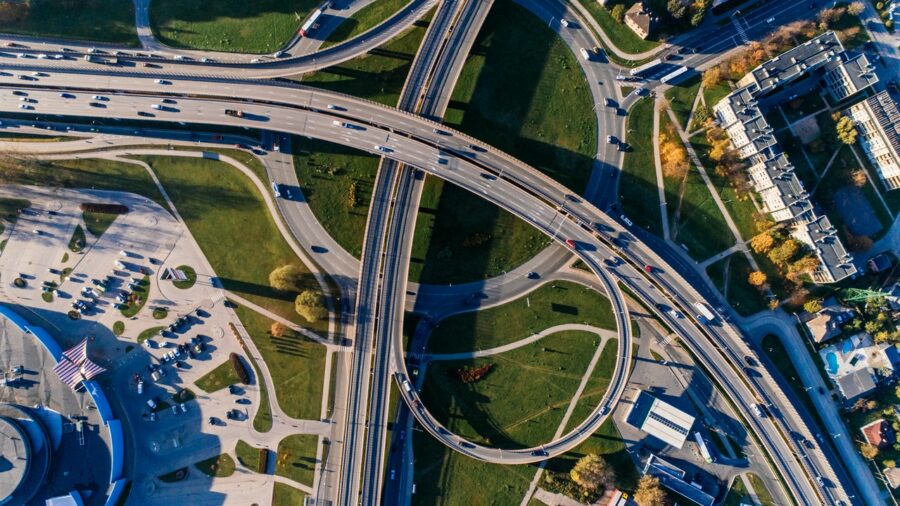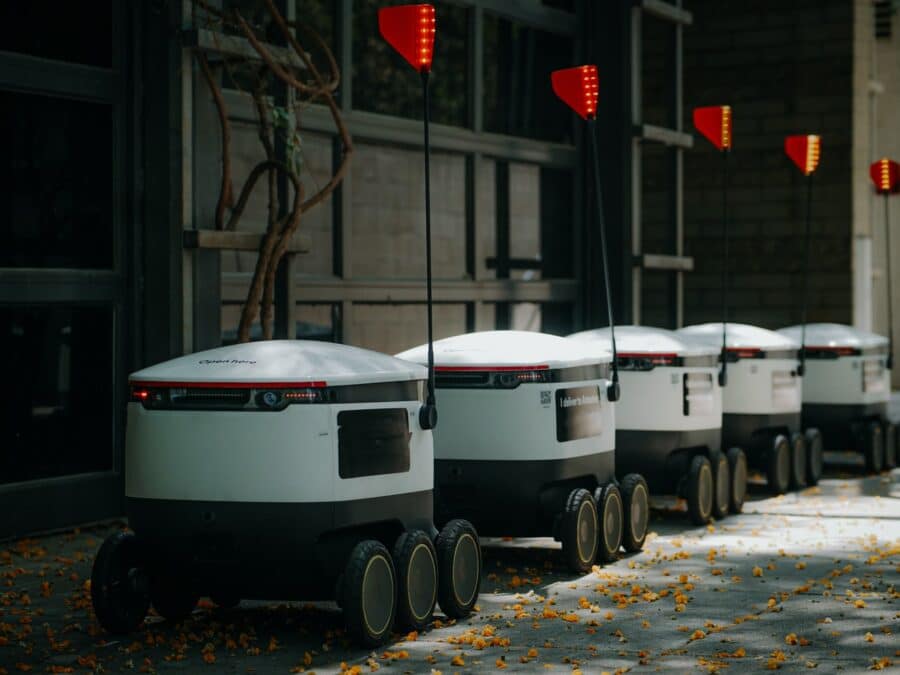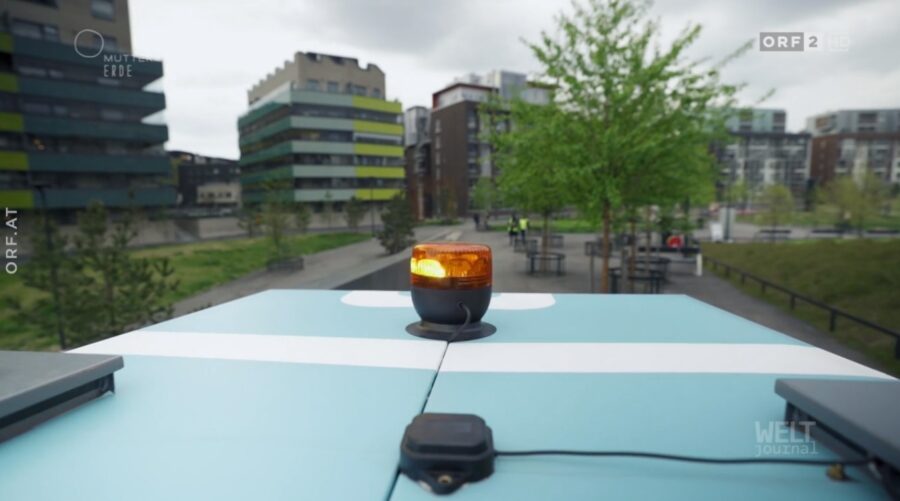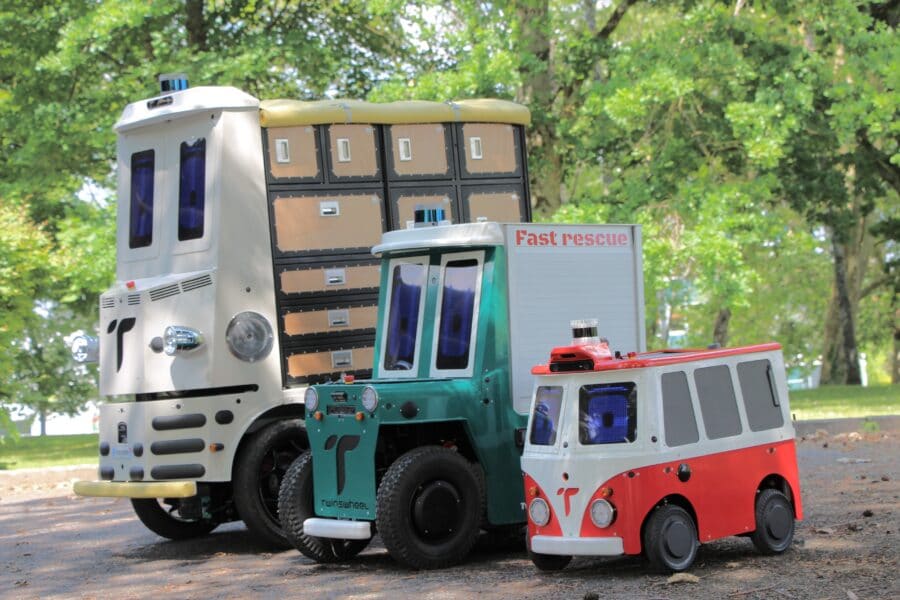An overview of the existing autonomous delivery solutions in 2022
Autonomous delivery solutions aim to resolve some of the toughest logistic challenges. These include, among others:
- The ecological footprint of parcel delivery
- The high cost of the last mile
- The difficulty of access to remote areas
- City centers’ congested traffic.
Around the world, a plethora of companies are studying the different use cases and are developing, testing and deploying autonomous delivery vehicles, drones and robots. Most companies are in the US (due to the more advanced autonomous delivery legislation), but Europe and Asia are also catching up.
In our last article, we’ve explored the different types of delivery solutions. In this one, we’ll look at some of the most promising specific robotics and software companies that are currently on the market, competing to optimize the first, middle, or last mile of deliveries.
It’s also important to say that funding for logistics startups in 2021 has nearly doubled, in comparison to 2020, according to a recent McKinsey report.
Because of the pressure that Covid-19 put on supply chains, both retailers and logistics companies have been looking for alternative ways to deliver goods to customers. In turn, this has led to an increase of investments in the logistics sector, and in innovative solutions for the last mile, in particular.
The last mile of delivery is attracting a lot of attention and investments – along with robotics-enabled solutions. The intersection of these two domains is LMAD’s main focus, as well – and this confirms, once more, the importance of our work.
Similarly to our previous article, we’ll split the overview in 4 sections:
- Autonomous delivery drones
- Autonomous trucks
- Autonomous delivery cars or vans
- Autonomous delivery robots.
Let’s dive in.
Autonomous delivery drones
Delivery drones are a type of unmanned aerial vehicle (UAV) used to deliver different types of payloads, such as:
- Small parcels (postal deliveries)
- Medical supplies
- Food.
There’s a transfer of knowledge between related sectors: unmanned transportation vehicles (like Airbus’ Vortex, an autonomous helicopter project) and drones use, in part, similar technologies.
Drones are particularly suitable for delivering to and from remote locations that are otherwise difficult to access. At the moment, drone delivery is in its infancy, although the sector is rapidly developing. Early experiments date back to 2013, when DHL tested a prototype drone called the Parcelcopter.
Since then, several companies have conducted drone delivery experiments, including Amazon, Google (under Alphabet’s subsidiary Wing), FedEx, AliBaba, JD.com, and many more. Volocopter, a project backed by several investors (among which, DB Schenker, one of our partners) is an autonomous drone which can carry goods of up to 200kg. In 2022, the Israeli startup Wonder Robotics raised $4 million to build an autonomous drone solution.
Let’s look into the most prominent developments of the past years:
Amazon Prime Air, US/UK
Amazon has stated their ambition to add a drone delivery service to their delivery options as early as 2013. In 2016, the Amazon Prime Air project was created, and the company completed a pilot experiment in Cambridge, England, which was heavily publicized. According to WIRED, however, the UK Amazon Prime Air team has been disbanded since. Since then, Amazon has obtained a number of permissions from the FAA (Federal Aviation Administration) in the US, which confirms the project hasn’t been abandoned and is still in development, although at a slower pace.
UPS’ Flight Forward, US
UPS is also making strides in developing an unmanned drone delivery service with their Flight Forward pilot project, and claims to be the first company to receive a Part 135 standard certification for a drone airline from the FAA, in 2019, a year before Amazon. This certification allows them to fly drones at night, out of the pilot’s line of sight, above people, and with a payload of more than 55 pounds (approx. 25 kg).
Wing, Australia/Finland/US
Wing is a drone delivery subsidiary of Alphabet, Google’s parent company. Previously under Project X, it was transformed into a separate company in 2018, and began delivering food in 2019 to residents of Bonython and in Logan, Australia, and has operations in Finland, as well. As of 2021, it has reached 100,000 drone deliveries, although it has faced complaints about noise levels from the public in Australia.
Wingcopter, Germany
Wingcopter GmbH is a German company that develops electric vertical takeoff and landing (eVTOL) delivery drones for commercial and humanitarian use. They have worked on a few projects to deliver medical supplies in Tanzania, Malawi, on a Scottish island, and on Vanuatu. The company has partnered with DHL and UNICEF, among others, and is currently planning to expand its operations to the US.
Zipline, US
Zipline is a US company developing, manufacturing and operating delivery drones. Similarly to Wingcopter, they are delivering medical supplies, and are currently operating or setting up operations in a few countries: Ghana, Rwanda, Nigeria, India, and the Philippines.
Autonomous trucks
Large-scale autonomous truck operations will probably be deployed in the next few years, especially in the US. Autonomous trucks are best suited for the middle mile of delivery, i.e. the highway segment of the delivery route, between the first and the last mile. This part of the route is the most predictable and the easiest to map out and define. Different truck platooning solutions, which link two or more trucks in a convoy, with the help of self-driving technology, are currently in development, as well.
SAE International, previously known as the Society of Automotive Engineers, a US-based international engineering association, has defined 6 levels of automation, from 0, or zero automation, to level 5, which corresponds to full autonomy. This system is also used by the US Department of transportation.
Level 4 trucks, where a human operator is still present and can override the vehicle’s systems, are currently tested by a few companies in the US, such as TuSimple, Waymo (another subsidiary of Alphabet, Google’s parent company), Gatik and Aurora. Another notable example is Starsky Robotics; however, after failing to secure sufficient investment capital, the company closed down in 2020.
As of 2022, GE Appliances and Oatly now use Einride’s autonomous delivery trucks in the US and Pony.ai will mass-produce self-driving trucks for the Chinese market.

Autonomous trucks are mostly suitable for the middle mile of delivery (i.e. highways)
TuSimple, US
TuSimple is a San Diego-based company, which was founded in 2015, and is currently developing level 4 trucks, operating on their Autonomous Freight Network (AFN) in Arizona, New Mexico and Texas. For now, TuSimple’s trucks operate with a human driver and a safety engineer on board.
Waymo Via, US
Waymo, a subsidiary of Google’s Alphabet, is one of the key players in the autonomous vehicle industry. It has a trucking division called Waymo Via, which was launched in March 2020, and will not manufacture trucks, but aims, instead, to work with manufacturers or logistics providers as a technology partner. Among their partnership deals, the most important ones are with UPS and Daimler AG.
Gatik, US
Gatik is developing short-haul trucks for B2B deliveries, and is helping retailers optimize the middle mile of their logistics operations. It was founded in 2017, and works with fixed pick-up and drop-off locations.
Autonomous delivery cars or vans
Self-driving cars have occupied the imagination of people for a while now, however an important distinction needs to be made between autonomous vehicles used for the transport of people (also referred to as robotaxis) and autonomous cars or vans used for the transport of goods. In this section, we’ll look into the second type of autonomous vehicles, exclusively used for delivery purposes. Of course, the technology is often similar for both, especially as far as sensors and mapping are concerned, but most companies specialize in either one or the other.
Autonomous delivery vehicles (ADVs) drive on roads, usually at moderate speeds (30-50 km/h), and be used for the delivery of goods to individual end customers, or to businesses (f.e. to resupply stores). Here, we have companies like Nuro, Udelv, and Gatik in the States, among others, Neolix in Asia, and Einride in Europe.
Nuro, US
Nuro was founded in 2016 by two engineers from Waymo, Google’s autonomous vehicle project, Jiajun Zhu and Dave Ferguson. Nuro’s total funding, according to Crunchbase, is currently $1.5 billion, and it’s set on becoming among the first autonomous delivery services in the US. Its flagship robot, R2, rides exclusively on roads, at a speed of around 56 km/h (35mph). Nuro has partnered with Domino’s Pizza, CVS Pharmacy and Walmart for pilot experiments.
Udelv, US
Udelv develops delivery vans that operate on roads, and was founded in 2016. Currently, a safety driver is present in Udelv’s vehicles. It has negotiated a partnership deal with one of Intel’s subsidiaries, Mobileye, in a project that aims to put into commercial use 35,000 autonomous delivery vehicles by 2028.
Robomart, US
Robomart, founded in 2017, aims to bring stores to customers via driverless mini-vans. Instead of ordering specific products, customers can hail an autonomous mini-store that comes to them, and lets them choose what they want to purchase. Robomart’s vans then calculate the amount due and process the payment. Currently, they have two types of delivery vehicles, the pharmacy Robomart, offering over-the-counter medicine and personal hygiene products, and the snacks Robomart, offering various types of snacks.
Einride, Sweden
Einride is a Swedish company that develops both electric trucks and autonomous delivery vans and small trucks, like the models AET 1 and AET 2 which can be used in both fenced areas and on public roads, for short distances. It’s among the few European companies that are developing autonomous delivery vehicles to be used on roads: the challenge in the EU comes not only from the technology itself but also from the currently existing legislative framework.
Autonomous delivery robots for the last mile
For a full overview of the spectrum of autonomous delivery solutions we need to also look into smaller autonomous delivery robots. They can either operate on the road or, very often, on sidewalks and bicycle lanes. Autonomous delivery robots are most often used for the last mile of delivery, to bring goods either to businesses or to end customers (i.e. for B2B or B2C last-mile deliveries), usually in an urban environment.
Autonomous delivery robots are smaller than the driverless cars or vans from the previous section, and also operate at lower speeds. They’re equipped with different sensors (radars, sonars, lidars, GPS, etc.) to sense their environment and react to obstacles, and move on pre-set navigation paths. The biggest actor in the field of autonomous delivery robots is Starship, and, contrary to the other types of delivery robots in our overview, Europe is relatively well-represented with initiatives such as TeleRail, EliPort and LMAD.
Starship Technologies, Estonia/Finland/US
Starship Technologies, an Estonian-born company, is one of the pioneers of autonomous robots for the last mile, and has received nearly $100 million in funding. Currently, it’s headquartered in California, US, but its engineering operations are in Estonia, while a satellite team also operates in Helsinki. Finland. It has steadily positioned itself on the individual meal delivery market in US university campuses, and uses small, lightweight robots to deliver hot meals to students.

Autonomous delivery robots waiting to be deployed
Scout by Amazon, US
Amazon’s delivery robot project, called Scout, was created in early 2019 and is currently being tested in a few locations in the US, including private campuses and office complexes, but also city neighbourhoods. Scouts move at a walking speed and on sidewalks. Amazon is planning to set up a new R&D center in Helsinki, Finland, to support the development of the project.
Kiwibot, US/Colombia
Kiwibot is a US company which develops and operates small robots for last-mile delivery. They’re currently operating in San Jose and Miami, and are aiming to deploy Kiwibots also in Pittsburgh, Detroit, Santa Monica and LA.
Eliport, Spain
Eliport is a Spanish company that is working on developing autonomous delivery robots for the last mile. The company aims to build robots that are capable of loading themselves up, without human intervention, to further simplify the delivery process.
LMAD, France/Finland
LMAD, our company, develops last-mile delivery solutions for logistics providers and retailers, helping them optimize delivery both in an urban and in an industrial environment, and also reduce the footprint of the last mile. At the moment, our focus is the EU: we’re currently working on a series of pilot experiments in Helsinki, Finland, and in the region of Paris, France, in partnership with different companies, such as DB Schenker, EDF and Nokia.

LMAD’s delivery robot as pictured by ORF’s WELT Journal team
TwinswHeel, France
TwinswHeel is a flagship project of the French company Soben, and was first launched in 2016, to develop autonomous parcel delivery droids. At the moment, they’re focusing on deliveries in enclosed sites, such as industrial campuses, but are planning to expand to eCommerce and convenience store deliveries in urban environments soon. Their robots are capable of carrying payloads from 40 to 600 kg, and have been tested and deployed in numerous experiments in France and abroad.

Three of TwinswHeel’s autonomous delivery robots
TeleRetail, Switzerland
TeleRetail is another European project for autonomous delivery robots. The company has received funding by the European Space Agency, and is currently developing Aito, software for autonomous vehicles, and Pulse 1, their autonomous delivery robot that can be used for last mile delivery in rural areas.
Other initiatives and companies
A few other companies developing autonomous robots or logistics platform have received significant investments to further develop innovative solutions:
- US-headquartered Ottonomy.IO raised $3.3 million to build and expand its network of autonomous delivery robots
- Estonia-based Clevon recently split from mother company Cleveron and went public through an IPO raising €5M to focus on building and selling autonomous delivery vehicles
- The Chinese company White Rhino raised over $7 million to expand its fleet of robots and delivery operations to more cities
Overall, funding for logistics startups has been steadily growing, after the massive disruptions of supply chains induced by the Covid-19 pandemic.

